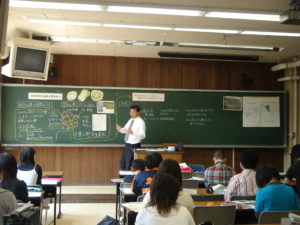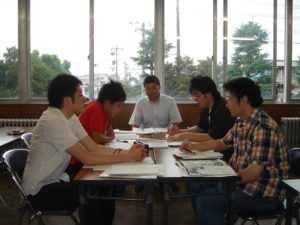なぜ社会科を学ぶのか?どのように社会科を教えるか?
私は、社会科教育の目的は、出来事や事柄を「暗記して終わり」ではなく、過去や現在の出来事を、あくまで材料として学び、最終的に「社会に対する見方・考え方」を身につけることだと考えます。
子どもたちがこれを身につけ、社会で生きていく手助けをする、そんな教育方法を築くことが私の使命だと思っています。
インタビュー(受験生向け)とラジオ講座(一般の方向け)で、このことに触れています。
受験生のためのFUKUDAI LIFE 社会科は暗記科目?「Noでしょ!」
興味のある方は、ぜひ読んでみてください。
教科書「を」教えるのか?教科書「で」教えるのか?
小・中学校で社会科を教えているにもかかわらず、「教材で取り上げている施設や地域に行ったこともない」という先生は多いでしょう。「指導書や教科書だけ」をたよりにして子ども達に教えることで、子どもは納得のいく理解を作れるでしょうか。
(残念ながら)教育現場に出たら、本当に教材研究の時間がなかなかとれません。
大学生のうちにこそ、教材で取り上げられている「現地」に出かけて取材をし、そこで湧き出る「自らの感性とアイデア」を生かしながら、「根源から授業を作る経験」をしておくことが必要です。
何を授業目標にし、どの様な内容を学ばせ、どの様な資料と指導方法を用いて授業を展開すれば、子どもが好奇心や追究心をはたらかせながら理解を深め、能力・技能を伸ばしていくことができるのか。
その判断は、教師自身が「現地での体験」をとおして、「感性と知性」をはたらかせる中で出来てくるのです。
社会科実践プラン構成論
(注:現在は開講していません)
学生時代は、比較的時間があります。
ぜひ本を読んで「感性と知性」を養ってください。
じっくり本を読む時間が取れるのは、学生時代が最後です。
私(寺尾)おすすめの本
担当講義

■ 学部
・ 批判的思考を伸ばす
・ 生活教材研究
・ 社会教材研究
・ 社会科教育法Ⅱ
・ 地理歴史科教育法Ⅰ・Ⅱ
・ 地域連携教育研究 A・B
■ 大学院
・ 社会科教育特論Ⅰ
・ 社会科教育演習Ⅰ
寺尾ゼミでは、本気で教師を目指す学生を支援しています。

寺尾ゼミでは、社会科教育全般から歴史教育・地理教育など、社会認識教育を中心に学習や研究を行っています。
子どもが、社会の事象や資料を自分で解釈し、互いにアイデアを出して検討し合い、理解をより深いものへと主体的に構築していく学習を重視しています。
また、子どもが多様な活動を行い、経験を豊かにして、もてる多様な能力を発揮しながら、新たに学力を伸ばしていくような学習指導ができるようにします。
社会科の授業づくりや指導方法の基本理論を学んだり、実際の授業観察を通して学んだりすることはもちろん、現地に出かけて調査したり体験したりする実地の教材研究や実地の指導実習をします。これまで蓄積された、すぐれた授業実践の分析や追試、授業づくりの理論の習得などを行います。
このようにゼミでは、社会科教師に必要な「実践的力量」を伸ばすことに力を入れています。
小・中学校の社会科教育や歴史教育、地理教育、総合的な学習などに関心のある学生、絶対に教師になりたいという意欲のある学生は、ぜひ寺尾ゼミに参加してみて下さい。
ゼミについての基本的な考え方
ゼミについての基本的な考え方を「 主免実習を終えたゼミ生への一言 」の中で示しています。
教員養成を目的とする学部で、社会科教育を特に深く研究する意義、教員になる上で、このゼミで学んでおくとなぜよいのかについて、実習で磨く「実践的力量」などとのかかわりにふれながら書いていますので、ぜひ読んで下さい。
卒業研究
寺尾ゼミの活動内容は、基本的には卒業研究を行うことです。
これについては、みなさんにもっと興味を持ってもらえる説明を考えているところです。
しばらく待ってください。
・卒論 中間発表会(12月中旬)
・卒論 提出〆切(1月下旬)
・卒論 発表会(2月中旬)
(参考) ゼミ卒業生の卒論・修論の題目一覧
教員採用試験対策の情報提供とトレーニング
社会科教育で卒業研究をするほとんどの人は、教員志望の学生です。
そのため、教員採用試験に向けての情報提供やトレーニングを行っています。
卒業後のバックアップ
少子化の影響による教員採用数の減少などで、どの教科・専攻分野に限らず、
現実には、4年生の時にすぐに教員採用試験に合格するのは、大変難しくなっています。
ゼミでは、卒業後、講師などをして採用試験に向けて頑張っているゼミの卒業生を支える活動も行っています。
Why study social studies? How do you teach social studies?
I think the purpose of social studies education is not to “memorize and be done with it”, but to learn about past and present events as material, and ultimately to acquire “a way of thinking and looking at society”.
I think my mission is to build an educational method that helps children acquire this and live in society.
I have touched on this in my interviews (for students preparing for exams) and radio courses (for the general public).
FUKUDAI LIFE for Students Preparing for Exams: Is social studies a subject that you have to memorize? “No, it’s not!
FBC Radio Course: ‘The Common Sense of History Will Change!
If you are interested, please read on.
Do you teach ’from” the textbook, or “with” the textbook?
Even though they teach social studies at elementary and junior high schools, there are probably many teachers who have never been to the facilities or areas featured in their teaching materials. Can children really gain a satisfying understanding of the subject if they are taught based solely on teaching manuals and textbooks?
(Unfortunately) once you are in the field of education, it is really difficult to find time to research teaching materials.
It is essential that while you are still a university student, you go to the “real place” that is featured in the teaching materials and gather information, and while making use of your “own sensitivity and ideas” that spring up there, you gain experience in “creating lessons from the roots up”.
What should be the goal of the lesson, what content should be taught, and what kind of materials and teaching methods should be used to develop the lesson so that the children can deepen their understanding and develop their abilities and skills while exercising their curiosity and spirit of inquiry?
This judgment is made by teachers themselves through their “experiences in the field” and by exercising their “sensitivity and intellect”.
Social Studies Practical Plan Composition Theory
(Note: This course is not currently being offered)
When you are a student, you have relatively more time.
Please read books and cultivate your “sensitivity and intellect”.
The time when you can take your time to read books is the last time you will have as a student.
My (Terao’s) recommended books
Courses in charge of
■ Undergraduate
・ Developing Critical Thinking
・ Research on Living Teaching Materials
・ Research on Social Teaching Materials
・ Social Studies Education Methods II
・ Geography and History Education Methods I and II
・ Regional Collaboration Education Research A and B
■ Graduate School
・ Advanced Social Studies Education I
・ Social Studies Education Seminar I
The Terao Seminar supports students who are serious about becoming teachers.
 In the Terao Seminar, we focus on learning and research in social awareness education, including all aspects of social studies education, history education, and geography education.
In the Terao Seminar, we focus on learning and research in social awareness education, including all aspects of social studies education, history education, and geography education.
We place importance on learning in which children interpret social phenomena and materials on their own, exchange ideas, and actively build a deeper understanding.
We also aim to provide learning guidance that allows children to engage in a variety of activities, enrich their experiences, and demonstrate their diverse abilities while developing new academic skills.
In addition to learning the basic theories of social studies lesson planning and teaching methods, and learning through observing actual lessons, we also conduct fieldwork, including research and experience, as well as practical teaching practice. We also analyze and repeat outstanding lessons that have been accumulated so far, and acquire theories of lesson planning.
In this way, the seminar focuses on developing the “practical skills” necessary for social studies teachers.
If you are a student who is interested in social studies education, history education, geography education, or integrated learning at elementary or junior high schools, or if you are a student who is absolutely determined to become a teacher, please join the Terao Seminar.
Basic Approach to the Seminar
The basic approach to the seminar is explained in “A Word to Seminar Students Who Have Completed the Teaching Practice”.
In this, I discuss the significance of studying social studies education in depth at a faculty that aims to train teachers, and why it is good to study in this seminar when becoming a teacher, while also touching on the relationship with “practical skills” that are honed through practical training, so please be sure to read it.
Graduation Research
The main activity of the Terao Seminar is to conduct graduation research.
I am currently thinking of a way to explain this in a way that will be of more interest to everyone.
Please wait a little while.
・Graduation thesis interim presentation (mid-December)
・Graduation thesis submission deadline (late January)
・Graduation thesis presentation (mid-February)
(Reference) List of graduation thesis and master’s thesis titles by seminar graduates
Information provision and training for teacher employment examinations
Most people doing graduation research in social studies education are students who want to become teachers.
For this reason, we provide information and training for teacher employment examinations.
Post-graduation support
Due to factors such as the decline in the number of teachers being hired as a result of the declining birthrate, it is becoming increasingly difficult to pass the teacher employment examination immediately after graduating from university, regardless of the subject or major field of study.
In our seminar, we also support graduates who are working as lecturers and other positions after graduating from university as they prepare for the employment examination.